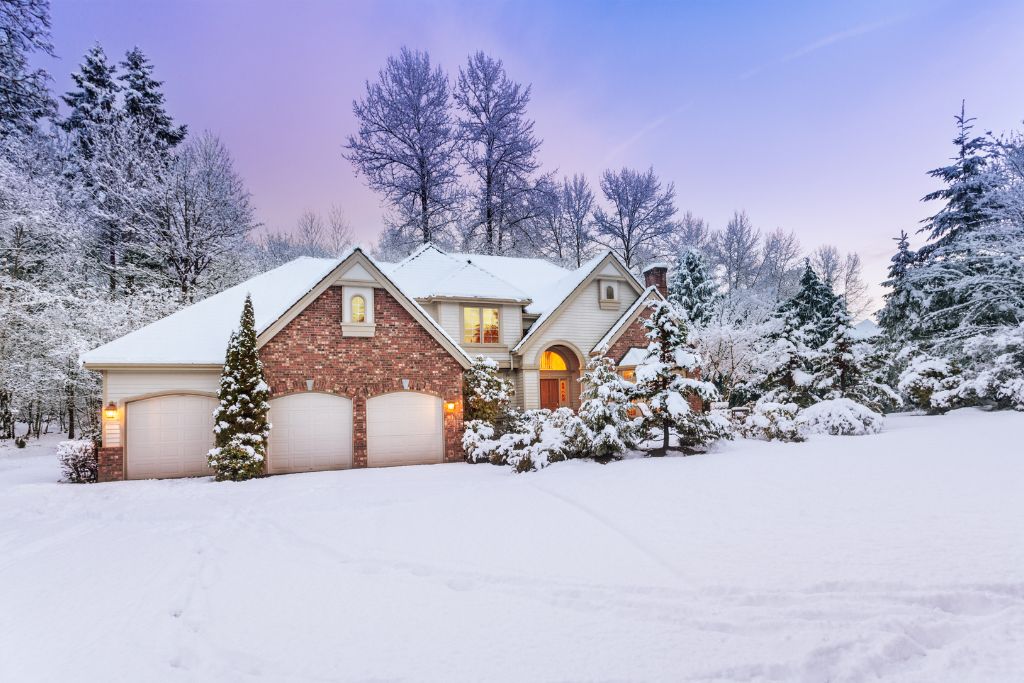Blog, Home Gardening Tips
De-Ice Your Driveway Without Damaging Plant Life
The onset of winter in the Midwest brings snow- and ice-covered driveways and walkways. And that means it’s time to break out the snowblowers, the shovels and the salt. Shoveling snow can be back-breaking and even dangerous, as approximately 100 people in the U.S. die each year from heart attacks suffered while or immediately after shoveling snow. Thousands more survive heart attacks, while tens of thousands incur injuries to backs, shoulders and ankles caused by overstressing muscles or slips and falls on ice.
For many, the go-to weapon against snow and ice on driveways and walks is old-fashioned – but extremely effective – rock salt (calcium chloride). In fact, it’s not uncommon for homeowners, property managers and road crews to prep paved services before a snow or ice storm with a layer of rock salt before the foul weather hits. Typically, once the snow and ice start to fall, the rock salt melts the precipitation, keeping the pavement clear and passable by people on foot or vehicles.
But, while salt gets results, it does have its downsides.
Rock Salt And Other Anti-Ice Treatments Can Lead To Damaged Concrete
Rock salt and other products that combat ice don’t melt ice; they lower the freezing temperature of water, which is normally 32 degrees. Depending on the amount of water and salt involved, the freezing temperature can be lowered by just a few degrees or to below zero. But no matter what, if the temperature drops low enough, the melted snow and ice will refreeze.
What can then happen is the melted snow and ice will seep into pores and fissures in the concrete and then freeze. As the water freezes it expands and cracks the concrete. Anyone who has seen a pipe freeze and burst can attest to the power of water expanding as it freezes.
Over time, the concrete will sustain increasing damage and cracking. And that can lead to a driveway or walkway needing to be replaced, which can be costly. All products that combat ice can have this effect, though rock salt is worse than calcium chloride, for example, as it lowers the freezing point of water much less than calcium chloride, which can drop the freezing point to –25 degrees.
Cracked Concrete Isn’t The Only Risk
While a damaged concrete driveway is a serious deterrent to using rock salt to fight ice and snow, rock salt has another downside homeowners should consider.
Rock salt is extremely corrosive. As snow and ice melt, the rock salt is washed from the driveway or walk, flowing downhill and into the surrounding soil. It then seeps into the soil where it can poison grasses, plants, shrubs and trees. It can also be splashed onto plants where it can also prove heavily damaging or lethal.
When rock salt dissolved into water is splashed or sprayed onto plants, it can cause salt burn, on leaves, buds, twigs and needles. This is especially dangerous for new leaves, buds or needles as salt quickly dries them, leaving them vulnerable to harsh, cold and dry winter winds, eventually killing them.
Salt absorbed into soil eventually seeps deeper into the ground and is absorbed by the roots of plants and trees. Without getting deep into the chemistry, the end result is that plant life – from grass and flowers to bushes and trees – are prevented by the salt from absorbing the minerals and nutrients they need. Over time, this results in dying leaves. In addition, the salt in the soil reduces the ability of plants to absorb water, creating a physiological drought for plants, grasses and trees.
What Is The Best Alternative To Rock Salt?
When it comes to plant life, calcium chloride is less of a problem than rock salt. While other alternatives such as urea and beet juice are options, they may not be as readily available or effective as calcium chloride.
One easy to find and inexpensive alternative that can be effective at creating traction on icy walks and driveways is sand. It won’t melt snow and ice, but it can increase traction, and it’s not toxic to plant life. However, sand will eventually wash from paved surfaces and into/onto surrounding soil, which can alter the composition of the soil.
Do You Have Questions About Caring For Your Trees, Lawns Or Landscaping? Consult With The Experts At Hansen’s Tree Service Today!
Our certified arborists are experts at diagnosing problems with trees, lawns and landscaping and they’re ready to help you today!
Contact us today and let our insured, experienced professionals take care of all your tree-related needs!
